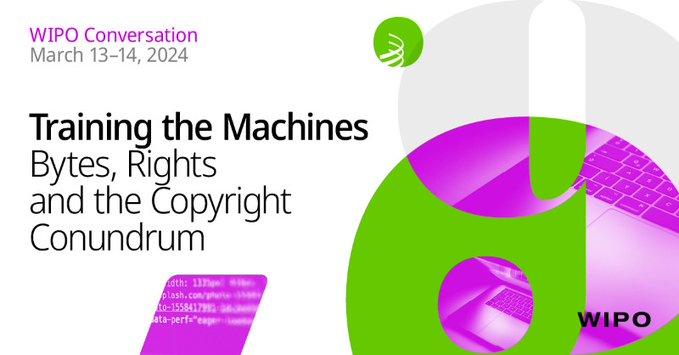CISAC Statement for the 9th Session of WIPO’s Conversations on IP and Frontier Technologies “Training the Machines – Bytes, Rights and the Copyright Conundrum”

The International Confederation of Societies of Authors and Composers (CISAC) would like to thank WIPO for the opportunity to join this important conversation and give its views on the use of training data in the context of generative AI.
CISAC is the leading worldwide organisation of authors’ societies. We represent more than 5 million creators from all geographic areas and artistic repertoires through our 225 members.
Generative AI represents a double-edged sword for the creative industry. On the one hand, it is a powerful ally that the creative industry embraces in partnership with the AI development community. On the other hand, it poses an existential threat to the creative sector.
Generative AI relies heavily on the use of pre-existing works for its development and improvement. Creative works are the fuel of the machine: the larger the dataset, the better the technology functions. However, the methods employed to gather and use training data, such as data scraping and web crawling, do not discriminate between copyrighted and public domain works and is performed autonomously. As a result, the data used to train generative AI is often collected without the awareness or authorization of rightsholders.
This practice has detrimental consequences for creators. By bypassing authorization, AI developers deprive creators of their right to negotiate appropriate compensation and license the use of their works as training data. Additionally, the outputs of generative AI can directly compete with the copyrighted works by producing text, music and images that, while machine-generated, could serve as substitutes for the works of human creativity. Hence, the current practice of AI developers not only undermines the existing economic rights of creators, but also erodes their ability to compete fairly in the creative marketplace.
In response to these challenges, the CISAC community has identified a number of measures that should be considered by policymakers to ensure that any regulatory initiative in this field carefully balances the interests of creators with the development of artificial intelligence.
In the first place, AI developers should be required to obtain proper authorization and licenses for the use of copyrighted works as training data and pay fairly for that authorization. This ensures that creators maintain control over the use of their works and are fairly compensated for their contributions to AI development.
Secondly, exceptions for text and data mining (TDM) – which do not provide for opt-out mechanisms – should not be extended to encompass the commercial use of copyrighted works as training data for AI. Such application of TDM exceptions may undermine the principles of the three-step test and disrupt the delicate balance inherent in copyright law. Clear guidelines should be established to provide legal certainty for AI operators seeking to utilize copyrighted materials within the TDM exception, as this exception should only be applied narrowly and under well-defined circumstances.
Thirdly, clear mechanisms should be in place to enable rightsholders to identify and enforce their rights in cases where their works are utilized to train AI systems. Transparency and accountability are paramount in this regard. AI developers must keep detailed records of the works used in their training data and make this information readily available to rightsholders. Transparency and accountability measures are useful not only to uphold the integrity of the copyright system, but also to facilitate the proper licensing of copyright protected works.
It is crucial for policymakers and stakeholders to engage in a meaningful dialogue to develop comprehensive and ethical solutions that balance the interests of creators, AI developers, and society. By fostering an environment that promotes innovation while safeguarding the rights of creators, we can ensure that AI enriches society without undermining the fundamental principles of copyright law.
While AI can serve as a powerful tool to enhance human creativity, it should never replace or diminish the importance of human authorship and original expression. The creative process, rooted in human experience and emotion, remains the driving force behind artistic innovation and expression.
CISAC remains committed to collaborating with WIPO and other stakeholders to address these challenges and opportunities in the ever-evolving landscape of AI and intellectual property. Together, we can chart a path forward that promotes creativity, innovation, and respect of creators' rights.
